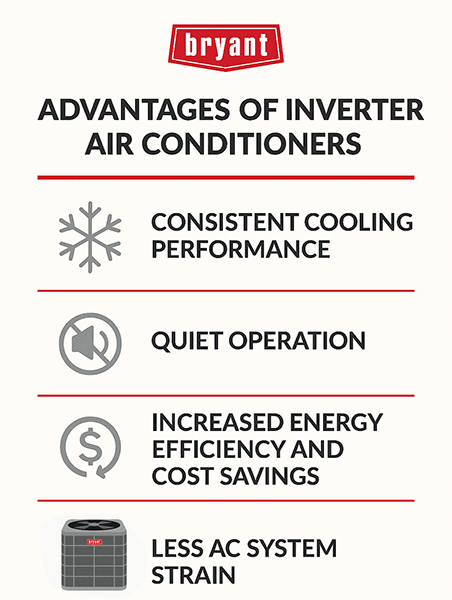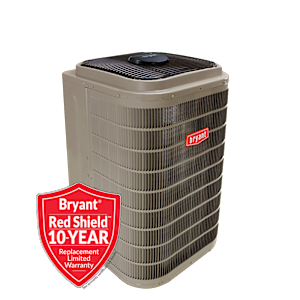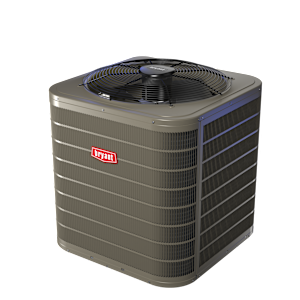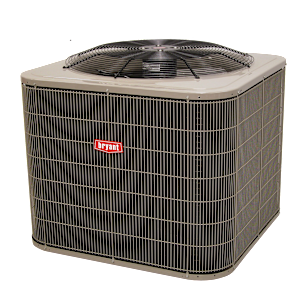Your Guide to Inverter Air Conditioners
What Is An Inverter Air Conditioner?
How Does an Inverter Air Conditioner Work?
How does inverter technology control temperature?
Advantages of Inverter Air Conditioners

“They’re very quiet units and provide higher efficiency than standard scroll-compressor air conditioners, which can translate into significant long-term energy savings,” Lea said. “They also deliver more even cooling because they run consistently rather than cycling on and off.”
“With a standard air conditioner, when the temperature rises by a degree, the unit runs at full capacity to cool the home quickly, then shuts off, repeating that cycle all day. An inverter compressor, on the other hand, operates almost continuously at a low speed on warm days, using the least amount of electricity to maintain the temperature.
“This consistent operation reduces temperature swings in the home, minimizes stress on the compressor, and extends its lifespan compared to traditional units that repeatedly start and stop,” Lea explained.
1. Consistent Cooling Performance
- Rapid Cooling: The compressor can ramp up speed initially to cool a hot room quickly.
- Steady Comfort: Once the target temperature is reached, the unit slows down to maintain it without overcooling.
2. Quiet Operation
3. Increased Energy Efficiency and Cost Savings
4. Less AC System Strain
Is an Inverter Air Conditioner Right for You?
When should you choose an inverter AC?
- Energy Efficiency and Cost Savings: If lowering your monthly bills is a priority, the efficiency of an inverter AC offers a strong return on investment, especially in areas with high electricity costs.
- Noise Levels: For light sleepers or those working from home, the reduced noise of an inverter split AC units is a game-changer.
- Budget vs. Value: While a central air conditioner with an inverter is a larger initial investment, the long-term operational savings and extended durability often outweigh the upfront cost.
- Sustainability: With lower power consumption, these units have a smaller carbon footprint, aligning with goals for environmental sustainability.
- Maintenance and Durability: Smoother operation means less strain on components, which can result in fewer repairs and less frequent need for heavy AC maintenance.
Installation and Maintenance of Inverter Air Conditioners
Professional Inverter Air Conditioner Installation
Regular Inverter Air Conditioner Maintenance
- Filter changes: Perform air filter replacement regularly to prevent airflow restriction.
- Clear debris: Additionally, clean the outdoor unit regularly to remove debris such as leaves or dirt.
- Professional AC Tune-ups: Regularly scheduled air conditioner maintenance with your local Bryant dealer can help prolong the life of your inverter air conditioner.
Why Choose Bryant Inverter Air Conditioners?
A Legacy of Trust
Advanced Technology
Bryant Factory Authorized Dealers

Connect With A Bryant Dealer For An Inverter Air Conditioner
Discover Bryant Air Conditioners
A Bryant air conditioner offers reliable performance, energy efficiency, and advanced cooling technology to keep your home comfortable year-round. With high SEER2 ratings, Bryant units provide cost-effective operation, reducing energy bills while delivering powerful cooling. Their durable construction ensures long-lasting performance, and quiet operation enhances home comfort. Plus, Bryant’s smart thermostat compatibility and industry-leading warranties make it a trusted choice for homeowners seeking efficient, dependable cooling solutions.
FAQs on Inverter Air Conditioners
- Learn about types of air conditioners
- Discover how does air conditioning work
- Discover the difference in a heat pump vs air conditioner
- Find out what temperature to set air conditioner in summer
- Learn about AC sizes: 2 ton, 3 ton, 4 ton, 5 ton





